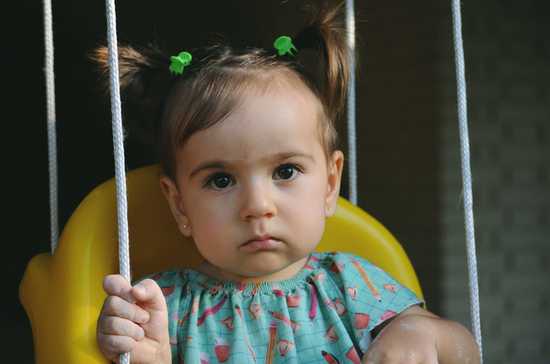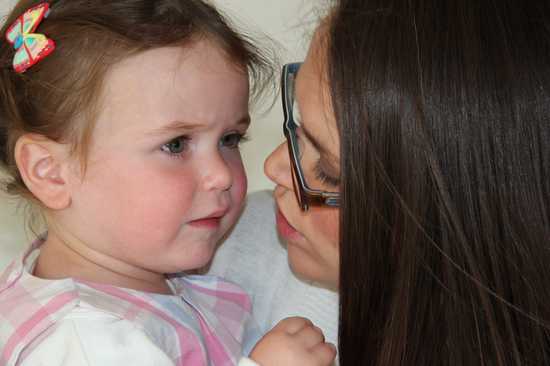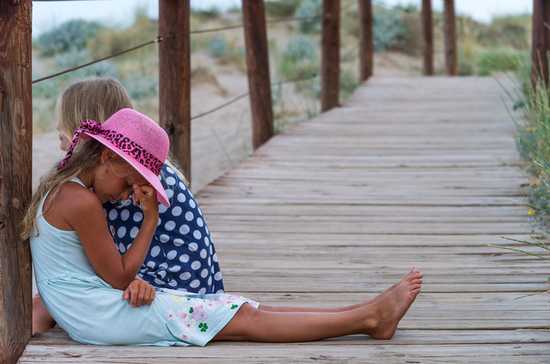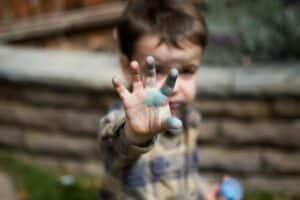Here is an overview of toddler hitting others. I experienced this with my son and researched extensively to find solutions. The reasons a toddler hits can be varied and sometimes difficult to understand. However, some common reasons might explain why your toddler is lashing out. Once you know the reason, it can be easier to find a solution. I’ve gathered all the information I could get from personal experience and research. Here’s what you need to know about toddler hitting others.

Reasons For Toddler Hitting Others
Even if your child comprehends the idea, they might be unable to stop themselves when other kids are present (1-year-olds have very little impulse control). They also lack comprehension of their own emotions, let alone anyone else’s, making it improbable that they would knowingly upset someone.
They’re Trying To Communicate
Like every other human, toddlers experience a full range of emotions, including boredom, hunger, and fatigue. The trouble is they cannot often communicate these emotions verbally, resulting in increased frustration.
Because your toddler’s vocabulary isn’t as advanced as an older child’s or adult’s, they rely more on nonverbal communication, such as facial expressions and body language.
They’re Defending Their Turf
You’ve undoubtedly noticed that your child hits more frequently at the playground or on a playdate. Your youngster’s fury or disappointment is difficult for him to control.
They’re Having A Bad Day
Toddlers can often lash out when they’re cranky due to their lack of coping skills. Even kids who don’t hit or bite often can lose control when they’re stressed, at the end of a long day, or simply having an off day.
They’re Imitating Someone Else
Some children see other people engage in play-fighting and want to try it for themselves. Unfortunately, often there’s a trial-and-error phase where they experiment with hurting others to see how it feels.
They’re Naturally Temperamental
Temperament has a big role. Some youngsters readily brush things off, while others enter street-fighter mode.

They Need Their Space
If they feel surrounded or trapped by other youngsters in a restricted area, they may attempt to hit (or scratch or bite) their way out.
How To Stop It?
Pinpoint The Reason
Attempt to figure out what has enraged your child to the point that they hit. Is it because they can’t discover a favorite toy? Are they irritated by someone in their space? Do they require food? Please give them the words to say what they’re feeling. If your toddler smacks a sippy cup of water off the table since they secretly desire milk, assist them in communicating this.
Be Proactive
Make sure your child takes frequent naps, has snacks on hand, and is used to transitions. When you prepare ahead of time, be creative as well: If they become enraged because their buddy always wants their favorite toy, offer them the opportunity to put it away before the next playdate.
Try Not To Lose It
Some kids thrive off of negative attention because it means they’re doing something right. If you overreact every time your child makes a mistake, they may think it’s funny (“Wow, Mommy/Daddy went crazy!”) and continue acting out to get another reaction.
Show Empathy
By giving words to your child’s emotions, you help them understand and cope with these feelings.

Tie Their Actions To Others’ Feelings
It’s tough for toddlers to grasp how their actions affect those around them. If your child hits a friend, take the opportunity to explain why that hurt their feelings. You might say, “I know you’re upset, but it wasn’t kind to hit Sam.”
Practice Problem-Solving
To help your youngster learn how to handle sticky situations, utilize imaginary play. If that doesn’t work, urge your young one to ask an adult for assistance. Act out these events frequently enough so that the lessons stick.
Monitor Their Media Consumption
It’s critical to be aware of everything your child watches, especially cartoons, to ensure that their programs aren’t violent.
Things To Avoid When Toddler Hitting Others
Hit Or Spank
Spanking, on the other hand, is a controversial topic across the world’s parenting communities.
It may be difficult for your kid to understand why you, as a role model, are hitting if you are striking. It’s also possible that modeling positive behavior to avoid hitting will confuse them. Please don’t engage in power struggles with your youngster; instead, try to gently return them to their time-out location after they’ve attempted to leave it.
Yell Or React With Anger
If you want your toddler to understand and respond well to you, it’s important that while they are learning self-control, you model the behavior yourself by remaining calm. Set a good example for them by using a soft voice and showing patience as you would like them to do.
Base Your Reaction On Other Parents
When it comes to behavioral options, there’s a continual feeling of mother guilt, mother shaming, and peer pressure in groups of parents. Don’t let these sentiments drive your decision-making when dealing with your child’s hitting behaviors. When you react differently depending on your surroundings or peers, take a step back to reconsider your parenting standards via self-reflection or discussion with your spouse.
Frequently Asked Questions
Q1: Why does my toddler hit others for no reason?
Ans: There are a few possible reasons your toddler hits others for no reason. Additionally, it could be that they’ve seen hitting modeled on TV or by other children and think it’s acceptable behavior. Finally, it could simply be a case of trial and error – they hit someone once and see that it gets a reaction, so they do it again.
Q2: Is it normal for a 2-year-old to hit others?
Ans: While it’s not “normal” because most children don’t hit others, it is relatively common. It’s important to remember that this is usually a phase that they will grow out of, as long as you model positive behavior and provide consistent discipline.
Q3: How long does the hitting phase last in toddlers?
Ans: The hitting phase doesn’t last forever, but it won’t go away on its own.
Q4: What are the signs of behavioral problems in toddlers?
Ans: A few signs might indicate a more serious behavioral problem in toddlers. If your child is hitting others and also exhibiting other aggressive behaviors, such as biting or kicking, this could be a sign of a bigger issue. Additionally, if the hitting persists beyond the toddler years, it could indicate a problem.
Q5: How do you react when a toddler hits you?
Ans: Simply guide their arm away from the individual they are hitting so they can’t strike again. You may allow them to try. Simply keep their arm off you or anyone else.
What To Do Next?
Be sure not to be too harsh when disciplining your toddler for hitting. Remember that they are still learning, and this is a phase that will eventually pass. Check out our ” Ten punishments that work” guide to get more information.







